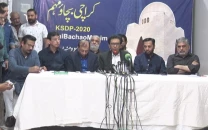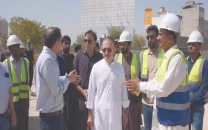Literature and peaceful society: ‘Give national status to regional languages’
This was discussed on the second day of a conference being held by the Pakistan Academy of Letters.

The conference comprises sessions with connoisseurs, writers and poets. STOCK PHOTO
The conference comprises sessions with connoisseurs, writers and poets, expressing their views on the role that literature and writers can play in moulding a peaceful society.
Speaking about the Urdu language, poet Aksi Mufi said that the treatment of the language in the federal capital is such that it is considered a shame to be 'Urdu-medium'.
He spoke about the imprtance of recognising regional languages as national ones. "It is high time that we rectify the mistakes we made in the past and give all the regional languages the status of national languages," he said.
He disagreed with the view of poet and writer Mobeen Mirza that political vision is restricted to politicians as the role of writers is solely conscience-awakening and guidance. "Literature tends to look at things from a holistic view," said Mufi. "Though power lies with the leaders, peace belongs to culture."
Mirza, on the other hand, stressed that the role of a writer is to awaken the conscience of the people and be a source of guidance. He believed that a writer is limited as he cannot compel people to follow him. "At the end of the day, it depends on the political vision of those in power how well they adapt to what a writer has envisioned," he said. Blaming writers for not performing their duties, he said, "It is not literature that is on a back foot; in fact it is the writers who are lagging behind with their roles."
According to Hyderabad-based writer Dr Ishaq Samijo, a writer should be the means of extinguishing the fire and not a contributor in igniting the fire in society. Citing art, poetry and theatre as the strongest of weapons, he said that education should be prioritised in favour of madrassas. "We should focus more on Baba Fareed Ganjshakar and his message of peace than Iqbal's conflict-oriented poetry."
The dean of Islamabad’s Air University humanities department, Dr Wasima Shehzad, highlighted how children’s literature can contribute towards the sound growth of children. Shehzad said that literature is often used to invoke tears as war creates a more engaging drama than peace. “Peace literature creates unity in diversity.”
Published in The Express Tribune, May 3rd, 2015.



















COMMENTS
Comments are moderated and generally will be posted if they are on-topic and not abusive.
For more information, please see our Comments FAQ